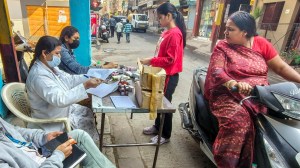Nepal146;s New Year
The Maoists are watching and so are the royalists. And the people are looking ahead impatiently for a better tomorrow. Nepal8217;s government needs to deliver quickly, writes Ananda Majumdar

ON Thursday Maoists in Nepal agreed to begin negotiations with the Koirala government indicating the peace process was finally moving smoothly towards a multiparty democracy. But it8217;s been a long trek.
As Nepal makes its way towards a new constituent assembly and multiparty democracy, such twists and turns are becoming common. Even so the political leadership needs to deliver quickly on the people8217;s mandate. They are being watched by the Maoists. The royalists too are keeping a close watch. If Nepal8217;s politicians slip, they could come right back into the reckoning.
Yet Nepalis are looking forward impatiently to a new Nepal. They want to get back in business. Take the tourist area of Thamel in Kathmandu, a stone8217;s throw from Narayanhity Palace. The shops and restaurants are full. Yet, the area closes down by 10 pm. This is a paradox visible elsewhere: hope and anxiety co-exist. There is a demand for change but not radically, there were protests against the king but the prime minister sought the royal mark of approval while being sworn in.
Lasting peace?
NEPAL8217;S way forward will be through peace, economic growth and political stability8212;not the kind of instability of recent times that saw a large number of young people leave the country. Even the Maoists seem hopeful that their dialogue with the all-party government will be successful8212;in marked contrast with their earlier failed talks in 2001 and 2003. 8216;8216;We have to mix radicalisation with a pragmatic approach,8217;8217; suggests Nepali Congress veteran Shekhar Koirala.
Prime Minister G.P. Koirala8217;s daughter Sujata Koirala, a prominent Nepali Congress member adds inclusive democracy and development to the list. 8216;8216;Development in the country is now zero.8217;8217; As top CPN UML leader Jhala Nath Khanal says, 8216;8216;After a path-breaking mass movement, the people of Nepal are entering a new, historic period. We have to consolidate the achievements of the recent day, institutionalise them and create a new environment for sustainable development.8217;8217;
It is a development that people like Krishna Gopal Karanjit and his family want to see. Karanjit, a resident of Kathmandu, has borrowed money to send his daughter abroad to study hotel management. His nephew too is abroad, using borrowed money to pay his fees. Karanjit can8217;t really afford a loan but he wanted to give his daughter a future. 8216;8216;The politicians have to create confidence in the people,8217;8217; says Karanjit.
That confidence building move will come by taking a cue from the pro-democracy movement to give the monarchy nothing more than a symbolic role and by starting development projects to show that the government means action. Building schools and hospitals and attracting foreign investment must follow because people in the outlying areas need to get their lives back on track. The question is: how long will peace hold?
The popular view in Nepal is that the army will have to be watched. Royalists fill its top rungs but as long as the new government remains strong they are unlikely to act against it. One suggestion is that changes be made at the top while the jan andolan sentiments are still fresh.
There also has to be an agreement on what should be sone with the king. The Maoists don8217;t want him, neither does the CPN UML. But, some other parties in the seven party alliance don8217;t mind a ceremonial role for him. The majority of political parties don8217;t want the king to go altogether. A top politician says, 8216;8216;The king has quickly shifted the onus on producing results on Koirala. If he fails, the people8217;s anger will be on the Prime Minister.8217;8217;
Gyanendra8217;s institution remains and his establishment is growing. According to one estimate, when Koirala was Prime Minister in 1991 Birendra was king then, the annual palace budget was Rs 4 crore. It is said to be over Rs 60 crore now.
Maoists8217; long shadow
HOPE in Nepal is tempered with anxiety over the role of the Maoists. Will they claim ownership of the people8217;s movement? When will they renounce arms? If they are to participate in the interim government, in what capacity will they?
Time to act is short for the present government which will initiate the process of multi-party democracy. And the new government when it comes in will have to deal with a sliding growth rate now pegged at a little over 2 per cent, give a push to the rural economy, and tackle low investor confidence and poor employment and educational opportunities. Nepal8217;s tax base at 10 per cent of the GDP is the lowest in South Asia. Badri Ojha of the Federation of Nepalese Chambers of Commerce and Industry says persistent liquidity problems have never given the government the confidence to move ahead on a 8216;lower rate, wider net8217; taxation policy.
In such an environment, political parties are seeing a future in the youth. That is because, says Sujata Koirala, more than 70 per cent of those in the people8217;s movement were young. 8216;8216;We will have to move along with the wishes of the people,8217;8217; Koirala explains. Those will have to include punitive action against officials who ordered repressive measures against the people8217;s movement.
Many of the country8217;s bureaucrats are stepping down to give the government a free hand to pick its officials. One of them is Shankar Sharma, chairman of Nepal8217;s planning commission. His believes Nepal should not push for pool funds, but must scale up on the work on privatisation. It must build the infrastructure to attract investment. Plans have been prepared for building a new airport in the southern part of the country. District roads will have to be built and there is the blueprint for revamping the east-west highway. Power tariffs need to be brought down.
8216;8216;We will have to kickstart the economy,8217;8217; says Sanjeev Puri, managing director of Surya Nepal, a joint venture tobacco giant with the largest turnover in Nepal.
That means giving a push to Nepal8217;s economy that is heavily dependent on remittances and tourism. Food processing, labour intensive light engineering and establishing special economic zones in hill areas with renewed special incentives to those setting up business are being proposed as growth areas.
With a little bit of help
ECONOMIC planners in Nepal say India8217;s help will come in handy in promoting Nepal8217;s tourism and in capability building. This has come through in preliminary discussions between Indian and Nepali leaders after Prime Minister Manmohan Singh spoke to Koirala offering India8217;s help in Nepal8217;s economic revival.
But there is a tentativeness about India. After Manmohan Singh spoke to Koirala about helping in Nepal8217;s economic recovery, Khanal said, 8216;8216;India must develop a very correct method to help Nepal,8217;8217; adding, 8216;8216;In the 21st century, we have to develop a wider and deeper relationship. For this new understandings are required.8217;8217;
Nepali Congress Democracy leader Pradeep Giri says Nepalis wanted to be in control of their destiny without interference.
So far Nepal8217;s reforms agenda has been dictated by development agencies. The country has 8216;8216;followed the fashion8217;8217; of other emerging economies to prepare the blueprint for reforms, often blindly. Yet, some reforms have indeed taken place. 8216;8216;We need political stability to move ahead and attract business to the country,8217;8217; says Sharma.
The financial sector has also been liberalised and there are joint ventures even with Indian banks.
Despite this, in Nepali homes not many believe that the present government will be able to deliver beyond the immediate objective of the constituent assembly elections and holding talks with the Maoists. The people also want the party leaderships to make way for youth leaders.
Clearly, Nepal has some tough challenges ahead.
THE WISH LIST
POLITICIANS
8226; Want to prepare the ground for conducting constituent assembly polls
8226; Build credibility among people, prepare blueprint for economic recovery
Shadow Side: The king remains a force, is waiting for politicians to fail. Also, old differences exist among parties
MAOISTS
8226; Creation of constituent assembly and all-party interim government to hold polls
8226; 12-point agreement to be basis of political roadmap, king shouldn8217;t have any role
Shadow Side Can call off talks if differences arise on constituent assembly polls. Not laid out a schedule for demobilising arms as yet
KING
8226; Holding on to power and is reluctant to withdraw from the scene
8226; Backed by influential royalists, politicians and top bureaucrats who feel he still has a role to play
Shadow Side
The youth, Maoists and Leftists see no role for him in future Nepal
PEOPLE
n Would like to see political stability and economic growth
n Favour new political leadership. Want officials punished for human rights violation
Shadow Side
Don8217;t trust politicians for keeping king out of political calculations
- 01
- 02
- 03
- 04
- 05































